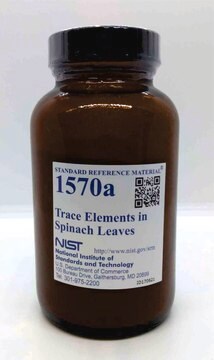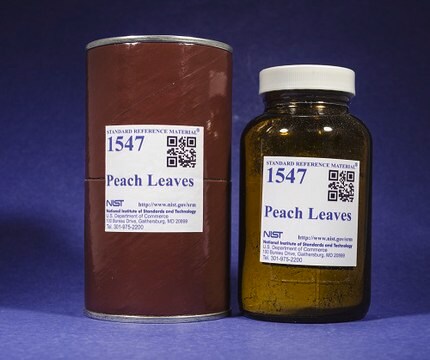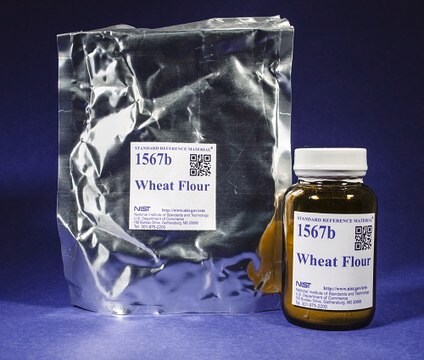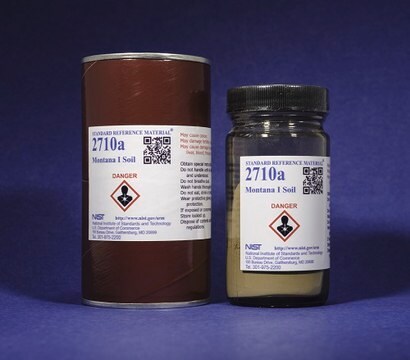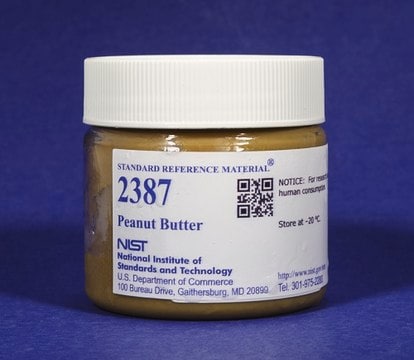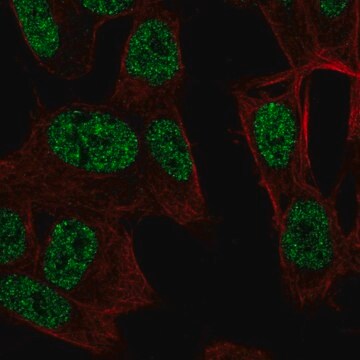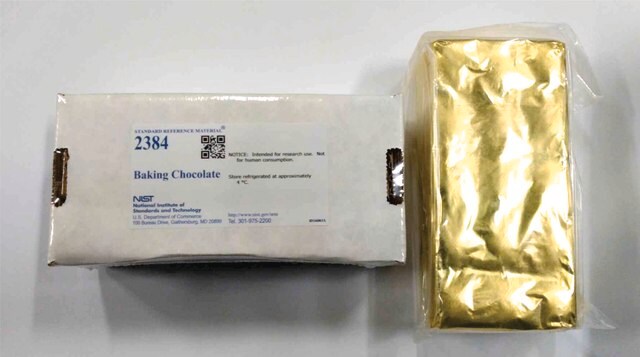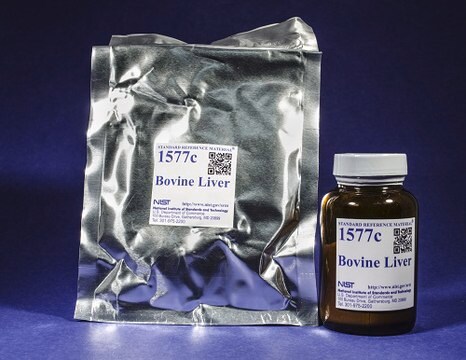NIST1573A
Tomato leaves
NIST® SRM® 1573a
Se connecterpour consulter vos tarifs contractuels et ceux de votre entreprise/organisme
About This Item
Code UNSPSC :
41116107
Nomenclature NACRES :
NA.24
Produits recommandés
Qualité
certified reference material
Niveau de qualité
Conditionnement
pkg of 50 g
Fabricant/nom de marque
NIST®
Format
matrix material
Description générale
Application
Tomato leaves has been used as a standard reference material
- in evaluating the cloud-point extraction methodology for copper and nickel determination in food samples
- for determining the precision of energy dispersive X-ray fluorescence spectrometry (EDXRF) method for nutrient analysis
- in evaluating the accuracy of high resolution continuum source flame molecular absorption spectrometry (HR-CS-FMAS) for determination of sulfur in food
- for evaluating the accuracy of thermospray flame furnace atomic absorption spectrometer (TS-FF-AAS) in cobalt determination in biological materials
Actions biochimiques/physiologiques
Tomato leaves is rich in calcium, magnesium, potassium and phosphorus. Other minor nutrients present in leaves includes sulfur, boron, manganese, iron, copper, zinc and molybdenum. All these nutrients constitute for the macromolecules like protein and nucleic acid. Also, helps in regulating the enzymatic activity of the plant, and for normal growth and reproduction.
Autres remarques
Certified for the analytes listed below. See certificate for values and more details
Kjeldahl Nitrogen, Nitrogen (Total), Phosphorus
Trace Elements: Aluminum (Al), Antimony (SB), Arsenic (As), Barium (Ba), Boron (B), Bromine (Br), Cadmium (Cd), Calcium (Ca), Cesium (Cs), Chlorine (Cl2), Chromium (Cr), Cobalt (Co), Copper (Cu), Gadolinium (Gd), Hafnium (Hf), Hydrogen (H), Iodine (I), Iron (Fe), Lanthanum (La), Magnesium (Mg), Manganese (Mn), Mercury (Hg), Molybdenum (Mo), Nickel (Ni), Potassium (K), Rubidium (Rb), Samarium (Sm), Scandium (Sc), Selenium (Se), Silver (Ag), Sodium (Na), Strontium (Sr), Sulfur (S), Thorium (Th), Uranium (U), Vanadium (V), Zinc (Zn)
Matrix Group: Fruits and Vegetables
Kjeldahl Nitrogen, Nitrogen (Total), Phosphorus
Trace Elements: Aluminum (Al), Antimony (SB), Arsenic (As), Barium (Ba), Boron (B), Bromine (Br), Cadmium (Cd), Calcium (Ca), Cesium (Cs), Chlorine (Cl2), Chromium (Cr), Cobalt (Co), Copper (Cu), Gadolinium (Gd), Hafnium (Hf), Hydrogen (H), Iodine (I), Iron (Fe), Lanthanum (La), Magnesium (Mg), Manganese (Mn), Mercury (Hg), Molybdenum (Mo), Nickel (Ni), Potassium (K), Rubidium (Rb), Samarium (Sm), Scandium (Sc), Selenium (Se), Silver (Ag), Sodium (Na), Strontium (Sr), Sulfur (S), Thorium (Th), Uranium (U), Vanadium (V), Zinc (Zn)
Matrix Group: Fruits and Vegetables
Informations légales
NIST is a registered trademark of National Institute of Standards and Technology
SRM is a registered trademark of National Institute of Standards and Technology
Produit(s) apparenté(s)
Réf. du produit
Description
Tarif
Code de la classe de stockage
13 - Non Combustible Solids
Classe de danger pour l'eau (WGK)
WGK 3
Faites votre choix parmi les versions les plus récentes :
Certificats d'analyse (COA)
Lot/Batch Number
Désolés, nous n'avons pas de COA pour ce produit disponible en ligne pour le moment.
Si vous avez besoin d'assistance, veuillez contacter Service Clients
Déjà en possession de ce produit ?
Retrouvez la documentation relative aux produits que vous avez récemment achetés dans la Bibliothèque de documents.
Les clients ont également consulté
Determination of sulfur in food by high resolution continuum source flame molecular absorption spectrometry
Zambrzycka E and Godlewska-Zylkiewicz B
Spectrochimica Acta. Part B: Atomic Spectroscopy, 101, 234-239 (2014)
Minerals, vitamins and chlorophyll contents of fruits, stems and leaves of tomato and garden egg
Kadiri M, et al.
Pakistan Journal of Medical Sciences, 25(3), 150-154 (2015)
Acid extraction and cloud point preconcentration as sample preparation strategies for cobalt determination in biological materials by thermospray flame furnace atomic absorption spectrometry
Donati GL, et al.
Microchemical Journal, Devoted to the Application of Microtechniques in All Branches of Science, 82(2), 189-195 (2006)
Mineral nutrition of tomato
Sainju UM, et al.
Journal of food, agriculture & environment, 1(2), 176-183 (2003)
Simple procedure for nutrient analysis of coffee plant with energy dispersive X-ray fluorescence spectrometry (EDXRF)
Tezotto T, et al.
Scientia Agricola, 70(4), 263-267 (2013)
Notre équipe de scientifiques dispose d'une expérience dans tous les secteurs de la recherche, notamment en sciences de la vie, science des matériaux, synthèse chimique, chromatographie, analyse et dans de nombreux autres domaines..
Contacter notre Service technique
